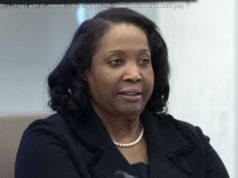After a day of Capitol Hill courtesy calls, Facebook CEO Mark Zuckerberg will testify on Tuesday afternoon about the social network’s rash of recent controversies, as members of the Senate Judiciary and Commerce committees line up to deliver the questions — and, surely, a few potshots at the embattled executive.
Still, the former California attorney general has signaled she is open to imposing new congressional regulations on Facebook and wielded both carrot and stick in exchanges with its representative, along with others from Google and Twitter, during a recent Senate intelligence committee hearing.
“Your decisions fundamentally inform public discourse,” Harris said. “So, our nation’s enemies have used your platforms in a way that has been designed to create and disseminate and advertise hateful rhetoric with the intent and the effect of disrupting our democracy.”
A few days earlier, Harris and Minnesota Sen. Amy Klobuchar, wrote a letter to the Federal Trade Commission urging it to review whether Facebook, in allowing tens of millions of its users’ data to be obtained by Cambridge Analytica, had violated a 2011 consent decree with the agency. Such a finding could cost the company billions.
Booker has been critical of the Trump administration’s reluctance to respond more directly to Moscow’s hacking and use of online propaganda to influence the 2016 election, telling NPR after this January’s State of the Union that the “cyberattacks… haven’t stopped” and are “getting more sophisticated.”
But this will be his first go at cross-examining the tech giants on such a big stage. If Booker’s past showings, when he’s had a seat at high stakes hearings, are any indication, he can be counted on to make waves — and a few headlines.
Whether Booker or Harris is willing to go a step further, and question whether Facebook is in violation of antitrust laws, will be of particular interest to the party’s progressive grassroots. Democratic leadership, in its “Better Deal” policy pitch from 2017, warned that “concentrated market power leads to concentrated political power” and pledged to break big companies’ “stranglehold on Washington.”
Does Facebook fit the bill? Asking Zuckerberg — under oath, the spotlight and growing public pressure — to explain why not could create the kind of stir that stands out in what figures to be a long afternoon featuring the same four or five questions being asked about 40 or so different ways.
Meanwhile, Zuckerberg has also tipped his hand. Late Monday morning, his prepared testimony to a House committee (he’ll be there on Wednesday) was posted online.
“We didn’t take a broad enough view of our responsibility, and that was a big mistake,” it reads, ticking off a laundry list of recent missteps. “It was my mistake, and I’m sorry. I started Facebook, I run it, and I’m responsible for what happens here.”






